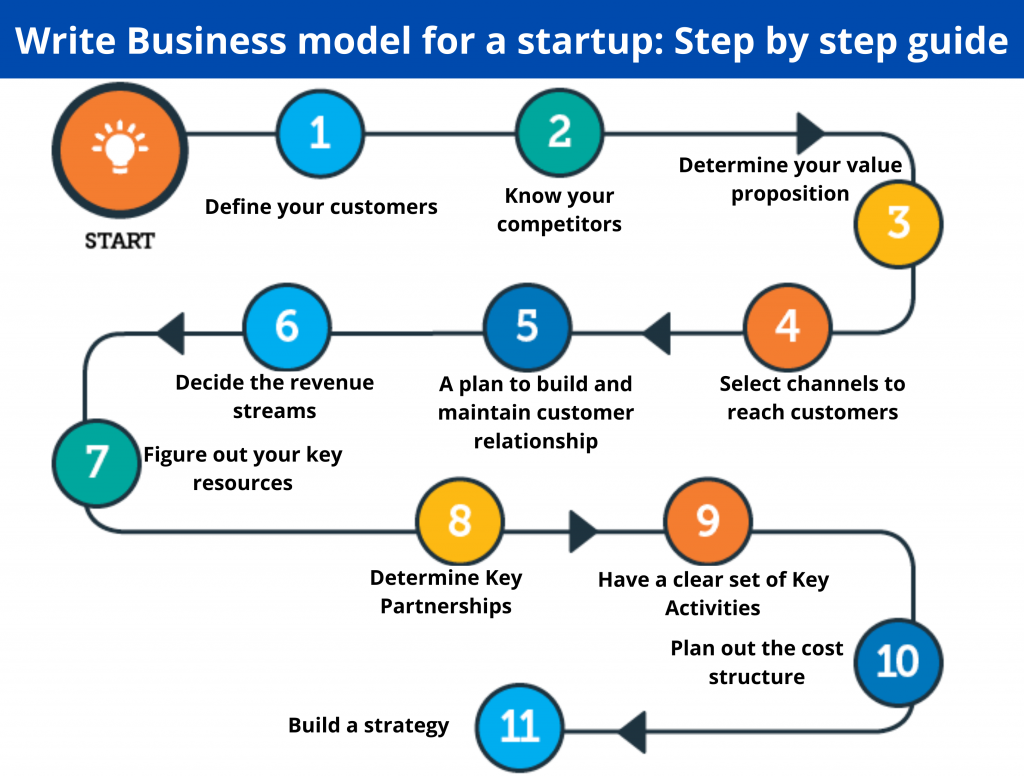Developing a Profitable Startup Model sets the stage for this enthralling narrative, offering readers a glimpse into a story that is rich in detail with deep and engaging interview style and brimming with originality from the outset.
Understanding the Market, Creating a Unique Value Proposition, Revenue Generation Strategies, and Scaling and Growth are just some of the key components that will be explored in this insightful discussion.
Understanding the Market
In order to develop a profitable startup model, it is crucial to have a deep understanding of the market in which the business will operate. By identifying key market trends, conducting thorough market research, and selecting the right market entry strategy, startups can increase their chances of long-term success.
Key Market Trends Impacting Startup Profitability
- Technological Advancements: Keeping up with the latest technological trends can give startups a competitive edge and help them deliver innovative solutions to meet market demands.
- Changing Consumer Preferences: Understanding shifts in consumer behavior and preferences allows startups to tailor their products or services to meet the evolving needs of their target audience.
- Globalization: With the rise of globalization, startups have the opportunity to tap into international markets, but also face increased competition from global players.
Importance of Market Research
Market research plays a crucial role in the development of a profitable startup model as it provides valuable insights into the target market, competition, and consumer behavior. By conducting thorough market research, startups can identify opportunities, mitigate risks, and make informed decisions that will drive business growth.
Comparison of Market Entry Strategies
Market Entry Strategies: Direct Exporting, Licensing, Joint Ventures, Franchising, Strategic Alliances, Mergers & Acquisitions.
- Direct Exporting: Involves selling products or services directly to foreign markets. It allows startups to have full control over their operations but requires significant investment and market knowledge.
- Licensing: Involves granting the rights to use intellectual property to a foreign entity in exchange for royalties. It allows startups to enter new markets quickly but may result in loss of control over the brand.
- Joint Ventures: Involves partnering with a local company to enter a new market. It can help startups leverage local expertise and resources but requires effective collaboration and risk-sharing.
- Franchising: Involves granting the rights to use a business model and brand in exchange for fees. It allows startups to expand rapidly with minimal investment but requires strict adherence to brand standards.
- Strategic Alliances: Involve collaborating with other companies to achieve mutual business objectives. It allows startups to access new markets and resources but requires strong partnerships and clear goals.
- Mergers & Acquisitions: Involve buying or merging with an existing company to enter a new market. It can accelerate market entry but requires careful due diligence and integration planning.
Creating a Unique Value Proposition
A value proposition is a statement that explains why a customer should buy a product or service, what makes it unique, and how it solves the customer’s problem or improves their situation. It is crucial for startup success as it helps differentiate the business from competitors, attracts customers, and drives growth.
Examples of Successful Startups with Strong Value Propositions
- Uber: “Get a ride at the tap of a button.” Uber revolutionized the transportation industry by offering a convenient and reliable way to hail a ride through a mobile app.
- Airbnb: “Belong anywhere.” Airbnb disrupted the hospitality industry by providing unique and affordable accommodation options in local neighborhoods, offering a more personalized experience for travelers.
- Peloton: “Bring the energy of group fitness to your home.” Peloton transformed the fitness industry by offering interactive at-home workout classes with top instructors, creating a sense of community among users.
Steps to Create a Compelling and Differentiated Value Proposition for a Startup
- Identify your target market: Understand your customers’ needs, preferences, and pain points to tailor your value proposition accordingly.
- Define your unique selling points: Determine what sets your product or service apart from competitors and highlight these key features in your value proposition.
- Communicate the benefits: Clearly articulate the value that customers will receive from choosing your offering, focusing on how it solves their problem or improves their situation.
- Keep it simple and clear: Avoid jargon and complexity, ensuring that your value proposition is easy to understand and resonates with your target audience.
- Test and iterate: Gather feedback from customers, analyze the performance of your value proposition, and make adjustments as needed to optimize its effectiveness.
Revenue Generation Strategies: Developing A Profitable Startup Model

In the world of startups, revenue generation is a crucial aspect that can determine the success or failure of a business. By exploring different revenue models and analyzing their pros and cons, startups can find the most suitable strategy to monetize their products or services effectively.
Subscription-Based Revenue Models
Subscription-based revenue models have gained popularity in recent years, offering a steady stream of income for startups. Let’s delve into the pros and cons of this particular strategy:
- Pros: Subscription-based models provide predictable revenue, allowing startups to forecast their earnings more accurately. It also fosters customer loyalty and engagement, as subscribers are invested in the long-term success of the product or service.
- Cons: On the downside, subscription-based models can lead to customer churn if the value offered does not justify the recurring payments. Startups must continuously deliver value to retain subscribers and prevent revenue decline.
Innovative Monetization Strategies, Developing a Profitable Startup Model
Startups can explore innovative ways to monetize their offerings beyond traditional revenue models. Here are some creative strategies to consider:
- Freemium Model: Offering a basic version of the product for free while charging for premium features can attract a wider audience and convert free users into paying customers.
- Affiliate Marketing: Partnering with other businesses to promote products or services in exchange for a commission can be a lucrative revenue stream for startups.
- In-App Purchases: For mobile apps, integrating in-app purchases for virtual goods or additional features can enhance user experience and generate revenue.
- Sponsored Content: Collaborating with brands to create sponsored content or advertisements can provide a source of income for startups with a strong online presence.
Scaling and Growth
In order to scale a startup for profitability, there are key factors to consider to ensure sustainable growth without compromising the bottom line. Utilizing the right strategies and leveraging technology can play a crucial role in efficiently scaling a startup model.
Key Factors for Scaling a Startup
- Market Demand: Understanding the market demand for your product or service is essential when scaling a startup. Analyze the needs of your target audience and tailor your offerings accordingly to ensure continued growth.
- Operational Efficiency: Streamlining operations and optimizing processes can help in scaling a startup effectively. Implementing automation tools and software can improve efficiency and reduce costs.
- Talent Acquisition: Hiring the right talent is vital for scaling a startup. Building a skilled team that is aligned with your company’s goals can drive growth and innovation.
- Customer Retention: Focusing on customer retention is as important as acquiring new customers. Providing excellent customer service and building strong relationships can lead to repeat business and sustainable growth.
Strategies for Sustainable Growth
- Diversification: Explore new markets, products, or services to diversify your revenue streams and reduce dependency on a single source. This can help in mitigating risks and fostering growth.
- Partnerships and Alliances: Collaborating with other businesses or forming strategic alliances can open up new opportunities for growth. Partnering with complementary companies can help in expanding your reach and customer base.
- Scalable Business Model: Develop a scalable business model that can adapt to growth without incurring significant costs. Flexibility and scalability are key components for sustainable growth.
- Data-Driven Decision Making: Leveraging data analytics to make informed decisions can drive growth and optimize performance. Analyzing data trends and customer behavior can provide valuable insights for scaling the business.
Role of Technology in Scaling a Startup
- Automation: Implementing automation tools for repetitive tasks can increase efficiency and productivity, allowing the business to focus on strategic initiatives for growth.
- Cloud Computing: Utilizing cloud services for storage, computing power, and software applications can provide scalability and flexibility for a growing startup without the need for significant infrastructure investments.
- Data Management: Efficient data management systems can help in organizing and analyzing large volumes of data, enabling the business to make data-driven decisions for scaling and growth.
- Digital Marketing: Leveraging digital marketing channels such as social media, email campaigns, and can help in reaching a wider audience and driving growth for the startup.
Last Recap
As we conclude our exploration of Developing a Profitable Startup Model, it becomes clear that success in the startup world requires a strategic blend of market understanding, value proposition creation, revenue generation strategies, and sustainable growth practices. This multifaceted approach is essential for any startup looking to thrive in today’s competitive landscape.
Expert Answers
What are some key market trends that impact startup profitability?
Key market trends such as changing consumer preferences, technological advancements, and global economic conditions can significantly impact startup profitability.
Why is a strong value proposition crucial for startup success?
A strong value proposition helps startups differentiate themselves from competitors, attract customers, and communicate the unique benefits of their products or services.
What are some innovative ways startups can monetize their products or services?
Startups can explore options like partnerships, licensing agreements, affiliate marketing, and freemium models to monetize their offerings in innovative ways.







